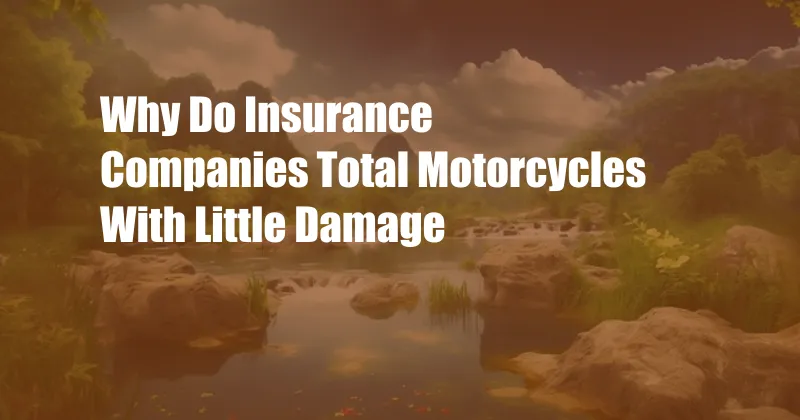
Why Insurance Companies Total Motorcycles with Little Damage
As an avid motorcyclist, I’ve been involved in my fair share of accidents. One particular incident left me puzzled and frustrated when my insurance company declared my motorcycle totaled despite the seemingly minor damage. This experience prompted me to delve deeper into the factors that influence insurance companies’ decisions to total motorcycles.
Upon researching, I discovered that insurance companies have established guidelines for determining whether to repair or total a damaged vehicle. These guidelines consider various factors, including the extent of damage, the cost of repairs, and the vehicle’s value before the accident.
Insurance Company Guidelines
Insurance companies typically follow the “80% Rule” when assessing damage. If the cost of repairs exceeds 80% of the motorcycle’s pre-accident value, the insurance company will likely declare it a total loss. This rule ensures that the insurance company doesn’t spend more on repairs than the motorcycle is worth before the accident.
Additionally, insurance companies consider the extent of the motorcycle’s damage. Some types of damage, such as frame damage or extensive engine damage, can significantly affect the motorcycle’s safety and value. In these cases, the insurance company may decide to total the motorcycle even if the cost of repairs is less than 80% of its value.
Diminished Value
Diminished value is another factor that insurance companies consider when determining whether to total a motorcycle. Diminished value refers to the decrease in the motorcycle’s value after it has been in an accident and repaired. Insurance companies may take this into account to ensure that the policyholder does not receive more than the motorcycle’s actual cash value.
For example, if your motorcycle’s pre-accident value was $10,000 and the cost of repairs was $5,000, the insurance company may determine that the motorcycle’s diminished value is $2,000. In this case, the insurance company would only pay you $8,000 for the motorcycle, which is its actual cash value after accounting for diminished value.
Latest Trends and Developments
In recent years, there has been a growing trend towards totaling motorcycles with less damage. This is partly due to the increasing cost of motorcycle repairs. The rising cost of labor and materials has made it more expensive to fix motorcycles, leading insurance companies to more frequently determine that a repair is not financially feasible.
Another factor contributing to this trend is the increasing complexity of motorcycles. Modern motorcycles have sophisticated electronic systems and fuel injection, which can be costly to repair. This complexity makes it more likely that even minor accidents can result in extensive damage.
Tips from an Experienced Blogger
Based on my experience as a motorcycle owner and blogger, here are a few tips to help you avoid having your motorcycle totaled in an accident:
- Ride defensively and wear protective gear to minimize the risk of an accident.
- Choose a motorcycle with a high safety rating and anti-lock brakes (ABS).
- Keep your motorcycle in good condition and have it serviced regularly to prevent mechanical failures.
If you do have an accident, be sure to document the damage with photographs and file a claim with your insurance company as soon as possible. Be honest with the insurance adjuster about the extent of the damage and provide them with all the necessary documentation.
FAQs
- Q: Why do insurance companies total motorcycles with little damage?
A: Insurance companies total motorcycles when the cost of repairs exceeds 80% of the motorcycle’s pre-accident value, when the damage affects the motorcycle’s safety or value, or when the motorcycle has diminished value. - Q: What is diminished value?
A: Diminished value is the decrease in a motorcycle’s value after it has been in an accident and repaired. - Q: What can I do to avoid having my motorcycle totaled in an accident?
A: Ride defensively, choose a motorcycle with a high safety rating, keep your motorcycle in good condition, and file a claim with your insurance company as soon as possible after an accident.
Conclusion
Understanding the factors that insurance companies consider when determining whether to total a motorcycle is crucial for motorcycle owners. By following the tips and advice outlined in this article, you can help protect yourself against having your motorcycle totaled in an accident. Remember, the safety of you and your motorcycle should always be your top priority.
Do you have any questions or comments about motorcycle insurance and totaling? Share your thoughts and experiences in the comments section below.